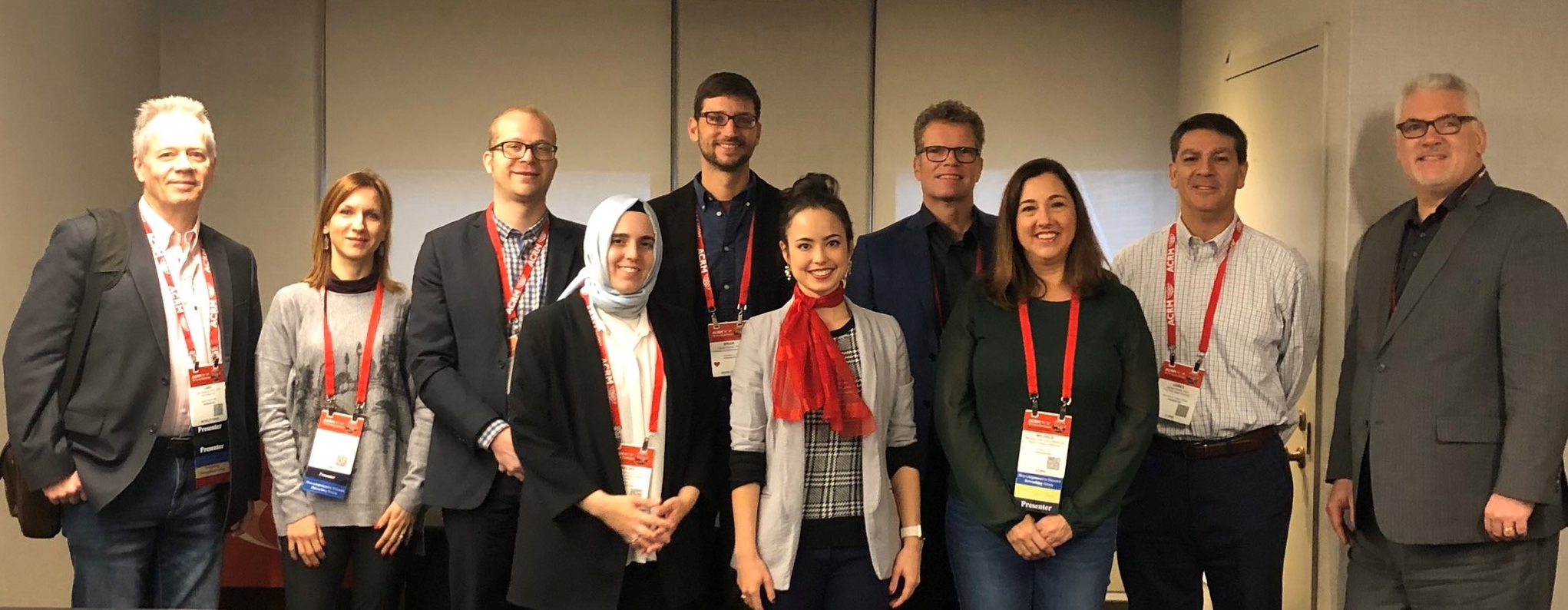Alzheimer’s Disease Task Force

Attendees of the 2019 Alzheimer’s Disease Task Force meeting in Chicago
The Alzheimer’s Disease Task Force aims to develop and disseminate up-to-date and clinically relevant research on the treatment of both at risk and diagnosed Alzheimer’s disease (AD) populations. Building on the current body of evidence, the group works to produce meaningful literature for those living with AD, their caregivers, and the healthcare team.
UPCOMING MEETING
Thank you for being a part of the NDNG Alzheimer’s Disease Task Force! We love that the ACRM attracts the most passionate interdisciplinary mix of rehabilitation pros from around the world. What an honor to collaborate with such driven individuals. We hope to meet with you at our upcoming networking group meeting to discuss current projects and opportunities for contribution and collaboration.
ND-NG Alzheimer’s Disease Task Force Meeting
Join us this month to discuss the ACRM Annual Conference, Task Force updates and new projects. We welcome your participation.
SAVE the DATE
DATE: 3rd Monday — every other month
TIME: 11:30 AM Eastern
Open Microsoft Teams or go to https://www.microsoft.com/en-us/microsoft-teams/join-a-meeting
Enter Meeting ID: 259 221 142 273 79
Click Join.
Enter the Passcode: ps7Bh9Ug
Click Join Now to enter the meeting.

Julie Faieta, MOT, OTR/L
CHAIR
Assistant Professor
Department of Rehab Science & Technology,
School of Health and Rehabilitation Sciences, University of Pittsburgh
HOW TO PARTICIPATE
The primary goal of these endeavors is to enhance the quality of life for those affected by AD through production and dissemination of high quality and clinically-applicable research. Roles within the group will include co-authoring peer-reviewed journal articles, developing patient/caregiver targeted information and education pages, and producing scholarship on the work being produced by the task force.
In addition, members will have the opportunity to participate in monthly meetings to discuss the status of current work and to deliberate on future aims. Outlined below are a number of anticipated projects to support the previously described goals:
- Systematic review of the current literature on non-pharmacological interventions for the treatment of AD
- Literature describing the role of rehabilitation professionals/clinicians in the treatment of AD populations
- Information/education pages describing topics such as AD stages/symptoms, and environmental supports and community resources relevant to AD populations
- Investigation into assistive technology, such as virtual reality, cognitive support, and environmental support technology, that has the potential to positively impact the quality of life and well-being of individuals affected by AD
- Survey members for additional project ideas during annual /monthly meetings
To learn about upcoming opportunities to participate, contact the Task Force Chair, Julie Faieta.
INFORMATION & EDUCATION PAGES (IEPs) PUBLISHED
The Alzheimer’s Disease Task Force has published the following Archives of Physical Medicine & Rehabilitation Information & Education Pages (IEPs).
- Hearing and Vision Impairment in People With Dementia: A Guide for Clinicians, Archives of Physical Medicine and Rehabilitation, Volume 101, Issue 9, 2020, Pages 1667-1670, ISSN 0003-9993, http://doi.org/10.1016/j.apmr.2020.04.012.
- Hammond FM, Hirsch MA, Davis CS, Nelson Snow J, Kropf M, Karlawish J. Voting is my super power: Voting tips for people living with disability. Archives of Physical Medicine and Rehabilitation, Volume 101, Issue 6:1101-1103. PMID: 32336492.
- Melike Kahya, Pallavi Sood, Hannes Devos, Shilpa Krishnan, Mark A. Hirsch, Patricia Heyn. Falls Risk and Alzheimer Disease: A Patient Guide. Archives of Physical Medicine and Rehabilitation, Vol. 101, Issue 5, p931–935.
- Elena Philippou, Rani Polak, Ana Michunovich, Michele York, Julie M. Faieta, Mark A. Hirsch, Patricia C. Heyn. Food for Thought: Basic Nutrition Recommendations for the Mature Brain. Archives of Physical Medicine and Rehabilitation, Vol. 100, Issue 8, p1581–1583.
IEPs Under Review
- Faieta, J., Negm, A., Sood,P., Beleno, R.,Heyn, P. Technology for Remote Caregiving: A Guide for Caregivers (August, 2020) (Submitted)
- Downer, B.,Knox, S., Wong D., Faieta, J., and Krishnan, S. Post-Acute Care: A Guide for Persons with Dementia and Caregivers (August, 2020) (Submitted)
IEP in Progress
Information & Education Pages in development
- Werneke Korsakoff Syndrome
- Ballet as an Intervention for Neurodegenerative Conditions
- Mild Cognitive Impairment
HOT OFF THE PRESS
Alzheimer’s Disease Task Force (ADTF) members, Dr. Julie Faieta (ADTF Chair), Dr. Hannes Devos, and Dr. Patricia Heyn led an article along with the other members of the ADTF. The title of this paper is Exercise Interventions for Older Adults With Alzheimer’s Disease: A Systematic Review and Meta-analysis Protocol, which was published in Systematic Reviews. The purpose of this paper is to present the protocol of systematic review and meta-analysis to assess the effects of structured exercise regiments on cognitive function in older adults with AD.











